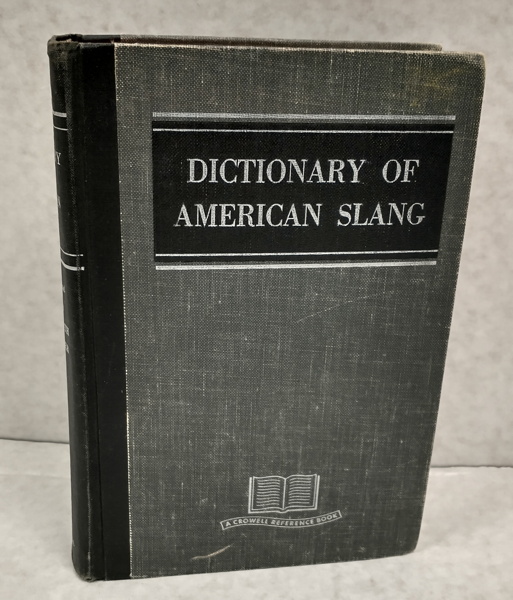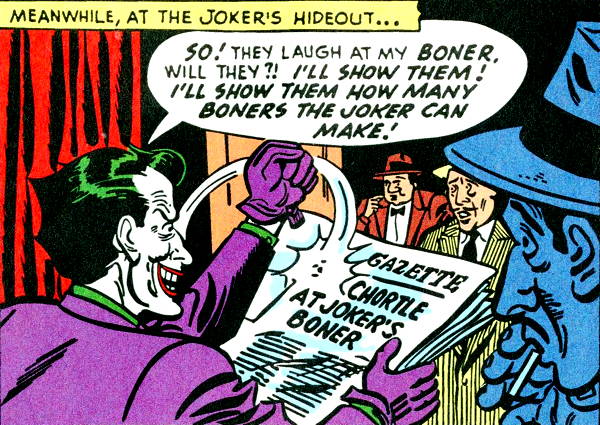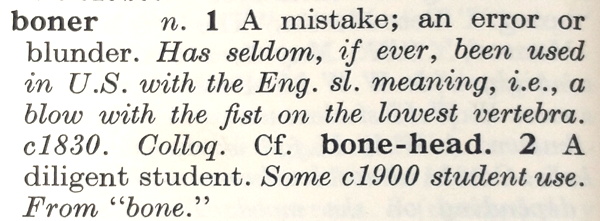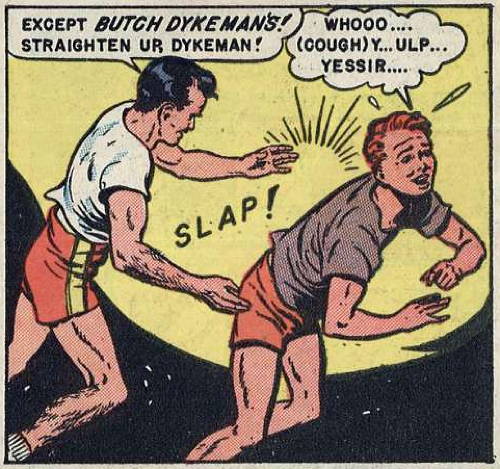This is kind of hard to figure out.

So a few decades back, my maternal grandmother (whom we called “Nana,” as “Grandma” “sounded old”) gave me the above book, found in one of her visits to a second-hand store. It is, as it says, the Dictionary of American Slang, and it is a first edition from 1960. It was, and still is, the source of much education and enjoyment, beyond immediately looking up all the dirty words I could find, of course, but even doing that was turned out to be more informative than prurient. It was a great gift, and one I still treasure to this day, though I know it has since been revised and updated, and there are any number of competing volumes on the same topic.
So why do I bring this up here, other than to show off something neat from ye olde Mikester bookshelves? Well, it came to mind while listening to pals Matt ‘n’ Chris on the latest “Every Story Ever” special from their War Rocket Ajax comics podcast. In said special, where they rank comic stories submitted by listeners, with Identity Crisis at the bottom and a comic that isn’t an issue of Swamp Thing at the top, a listener sent in Batman #66 (1951) for their consideration.
Oh, which comic is Batman #66 (1951), you’re asking? “Why, we’re not familiar with that particular issue!” you add. To which I respond, “oh, you know this comic.” In fact, there was a time on the internets where you couldn’t avoid the continuing mirth this comic inspired, with its panels scanned and uploaded and shared and hotlinked to the point of everyone everywhere getting an eyeful of Joker’s boner:

Yup, it’s that story, officially titled “The Joker’s Comedy of Errors!” and, according to the Grand Comics Database, credited to writer Bill Finger and artists Lew Sayre Schwartz, Charles Paris, and, surprisingly, Bob Kane, who apparently did draw the figures of Batman and Robin themselves, probably under duress.
Anyway, you’ve seen the panels, there are lots of talk about “boners” (in the meaning of “mistakes”) and reading those panels in our hip, modern, ironic age, where “boner” can mean something else entirely…well, you can see how the story comes across quite a bit differently now. The entire story is “boner” this and “boner that” – “how can he force you into a boner?” “They laugh at my boner, will they?” “More boner crimes to come!” And so on.
Now, the Bits Boys on War Rocket Ajax contend, as many do, that at the time of the comic’s publication in the early 1950s, “boner” did not have the more vulgar meaning associated with it today. In contrast, I posted on the Twitters that the writer of the book knew exactly what he was doing, entertaining himself with a story-long dirty joke that he got past his editor.
Which got me to thinking. I once heard that pretty much any filthy word you know now, people knew back then, and whatever scatological or sexual term you may utter ain’t any different from what your great-grandpa would say. You don’t need to tell me that’s overstating it a bit, as I’m aware. But it would seem that “boner” in its vulgar sense wouldn’t necessarily be a recent innovation, would it?
Thus, to the slang dictionary, where the definition of “boner,” as it stands (heh) in 1960, according to this book’s editors:

That’s that then, I guess, right? Well, not necessarily, in that 1) this is the first edition of this work, and perhaps future revisions have expanded the entry and provided more dating citations, and 2) I’m sure some slang didn’t make it in, either from limited use or just not being picked up during the research phase.
And then there’s this…the definition for “bone” just a couple of entries earlier. Didn’t take a pic, as it’s a long (heh) entry, but definition #5 is “[taboo] The penis, esp. the erect penis.” So at least by 1960 the base (heh – okay, I’ll stop) of “boner” is present and notable. It feels like it isn’t that far of a jump from “bone” to “boner,” particularly since the term “boner” already exists in a more socially acceptable form and thus was a recognizable variant of the word.
I did some further online research, which of course required typing the word “boner” into website after website — hello, NSA! — and didn’t find very many helpful citations. One that did seem to support the idea that ol’ Bill Finger was pulling a fast one in his funnybookin’ was this entry from Entomology Online, which notes
“Meaning ‘erect penis’ is 1950s, from earlier bone-on (1940s), probably a variation (with connecting notion of ‘hardness’) of hard-on (1893).”
I checked for “bone-on” in my Dictionary of American Slang and found nothing, which again could just mean it was missed in the initial surveys.
This other online source, Green’s Dictionary of Slang, has as its earliest citation for the meaning we’re seeking as 1966. And Merriam-Webster cites a date of 1896 as the earliest use of the word “boner,” admittedly not in its naughty sense. But the construction “boner” existed in the world, and again, I contend it’s not that big a leap from “bone” meaning an erect penis to “boner” meaning the same thing.
Whether it was in common usage by the early 1950s is another question. I think it’s possible Bill Finger would have known the other meaning of the term…we would have only been about 37 at the time, still young enough to have been at least vaguely aware of the New Hip Slang all the kids were using, but, to be honest, probably old enough not to want to screw up a paying gig by trying to get a dirty joke into print in a children’s comic book.
As such, my assumption is…while “boner” (or at least close variations of it) may have been in use with its sexual definition at the time, Finger most likely used it innocently in this story. Howver, I’m guessing a non-zero percentage of readers in 1951 probably found this as funny as a bunch of bloggers did circa 2006, for the exact same reason.
Now this whole Toni Gay/Butch Dykeman thing that pal Andrew reminded me about:

…I mean, there’s no reason to expect that was anything but innocent comic booking, surely.
Note: I know about the Nicholas Cage dirty word documentary series on Netflix.
Also, if you have additional information/links regarding the history of “boner” — yes, please leave that in the comments. We’ll get a grip on these boners yet!








The cartoonist Scott Shaw! used to have a website called “Oddball Comics,” in which some version of the question “Did the people who made this comic really intend the reference to sex/naughty bits/drugs/whatever we are all finding in it?” often arose. Shaw!’s standard response, based on his wide acquaintance with comics writers and artists, was that, yes, they did.
Discussions of this particular comic always bring to mind the Growing Pains character played from 1985 to 1989 by the late Andrew Koenig: Richard “Boner” Stabone.
While I might believe that Kirk Cameron, noted banana enthusiast, did not understand the snicker-inducing nature of Mr. Stabone’s nickname, I very much doubt that someone as worldly as Alan Thicke didn’t get it.
— MrJM
Something of which I have been reminded:
There was a period, in the late ’70s or early ’80s, when George Carlin frequently substituted for Johnny Carson as host of “The Tonight Show.” One night, Carlin’s first guest was Pat Boone. For some reason I have now forgotten, the topic turned to Boone’s exercise regime. He explained that at first he had been immobilized by cramps and sore muscles after exercise, but he had found that he could take care of that by using a vibrator. He went on at some length about this wonderful vibrator. The audience laughed uproariously at each use of the word, while Carlin sat stonefaced. At last a clearly perplexed Boone said “What are they laughing at?”
Another story, this one actually related to comics:
About twenty years ago, one of the religious cable channels (I forget which) ran a public domain movie every weekday at noon. I got into the habit of watching these during my lunch break. One day the movie was the 1940 version of “Li’l Abner.” Throughout the first part of this movie, the phrase “make love” is repeatedly used in the old-fashioned sense of “to woo, to romance.” This channel bleeped it out every time.
Now, I ask you: How many of the people watching, on hearing Daisy Mae say “I wish he would (bleep) me,” or Li’l Abner say “Daisy Mae, I’m gonna (bleep) you,” filled the blank in with “make love to”?
In the service of prudery, the channel actually made the movie a lot dirtier.
Here’s an episode of Comic Tropes where Chris talks about the GA Blue Beetle fighting a gangster called Big Dix. You ask, did the writer know what he was doing? Given the number of times Big Dix is called by name, I’d say yes.
https://www.youtube.com/watch?v=zuo8yCr3a2w
There was also the Confederate-themed heroine called “Little Dix” but I don’t think she ever saw publication…
The Oxford English Dictionary has a 1936 reference for that sense of “boner”, albeit as a riff on the sense the Joker is (ostensibly) using. I’ll email you a screenshot.
I’ve always figured that “boner” could be a shortened version of “bone-head”, which would also tend to make the word a little more innocuous.
Seriously, that Joker panel was everywhere.
Surely this must figure into your equations: https://en.wikipedia.org/wiki/Boner%27s_Ark
Another presumably innocent usage of the same era: https://www.unz.com/print/ElleryQueenMM-1961dec-00129/
1991 (!) innocent usage by Ronald Reagan!
https://news.google.com/newspapers?id=OWkiAAAAIBAJ&sjid=EaoFAAAAIBAJ&pg=5432%2C3019526
Boner from bone-head from caveman. That’s how I always saw it.
But here’s how I learned the word when I was quite young. Type in Merkle’s Boner to Wikipedia. Anyone who is a Cubs fan at some point will be told about Fred Merkle’s Boner.
It’s about time people paid more lip service to the Joker’s boner.
Rich: I hand to wrap my hands around that one to get it.
Actually, Paul, I thought you were referring to the author’s name. The cousins who wrote under the name “Ellery Queen” later admitted they were unaware it was a slang term for homosexual, even when they coined it.
Never knew that, Brad!
>So at least by 1960 the base (heh – okay, I’ll stop) of “boner” is present and notable.
The base perhaps, but far from the tip.
It warms me to see this subject attain new virility. It is surely the most tumescent post in Mike’s blogging history.
[…] reader Paul reminded me of this: the Blackthorne Publishing edition of Boner’s Ark, published in 1986. Boner’s […]
[…] going to use Diamond Comics to distribute their books, I was sweating it a bit, given the number of boners they’ve pulled of late regarding books just straight up not showing up and not having the […]